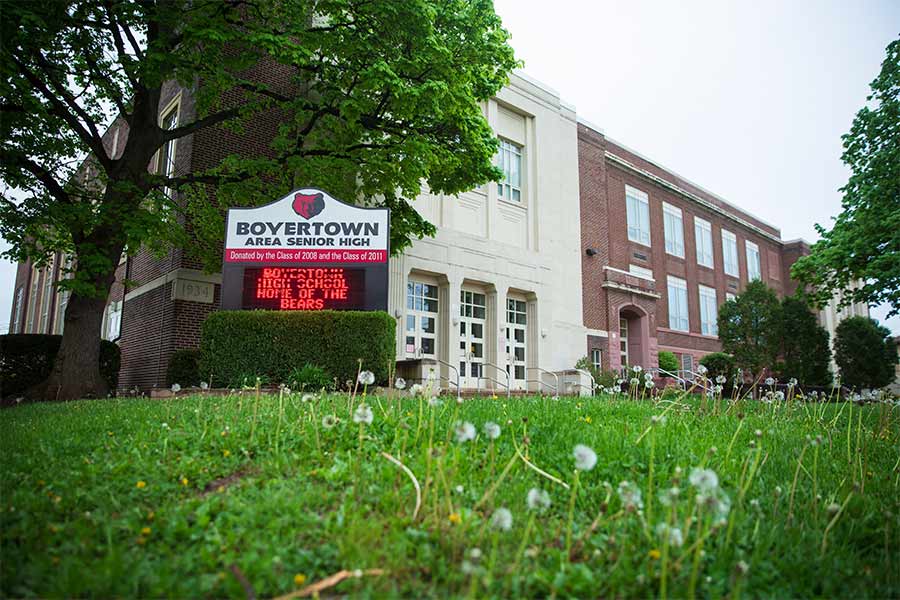
Recently, it seems like women’s spaces have been swept up into the storm of the gender identity debate. Activists have been pushing for men who identify as women to use women’s-only locker rooms, restrooms, and other private spaces.
This push undermines women’s safety and privacy under the guise of “inclusivity.” But this movement is far from new.
Back in 2017, Alliance Defending Freedom defended students and parents in Boyertown, Pennsylvania, after a local school district passed a policy forcing students to share private spaces with individuals who identified as the opposite sex.
One student, Alexis Lightcap, didn’t know about the policy until she saw a boy in the girls’ bathroom. Read more about her story and the case Doe v. Boyertown Area School District below.

Who is Alexis Lightcap?
One day during her junior year at Boyertown Area High School, Alexis walked into the girls’ restroom in her school. She froze in shock when she discovered a male in the bathroom, washing his hands.
Alexis turned and ran out of the bathroom and reported the incident to a school administrator. But the school administration did nothing. The district had quietly passed a policy allowing students who identified as the opposite sex to use the restrooms of their choice—all without informing parents or students.
So, instead of listening to her concerns, the school made Alexis feel as if she were the problem for feeling uncomfortable and unsafe with a boy in her bathroom. For months after the incident, Alexis avoided using the main girls’ restrooms. She felt like she had to protect herself and be more cautious. And it seemed fundamentally unfair: as a female, she should be able to use women’s private spaces without the fear of encountering a male.
But Alexis was no stranger to encountering injustice and adversity. As a child, she and her sister were taken away from their biological mother and put into foster care. Like many children in the foster care system, Alexis felt like her life was out of control and she had no voice. She recounts being a quiet child who allowed others to speak for her.
Thankfully, Alexis was adopted into a loving family. But even though she gained a stable home life through adoption, moving to Boyertown, Pennsylvania, wasn’t easy. Alexis was one of less than a handful of black students among the 1,800 students at Boyertown Area High School.
But these difficult experiences made her stronger. Alexis is not one to dwell on things or worry about circumstances that are out of her hands.
Alexis knew what it felt like to stay silent. That’s why after the incident at her school, she decided to take a stand. Alexis joined a lawsuit against the school district in which she attended to defend girls’ privacy and safety.
Doe v. Boyertown Area School District
During the 2016-2017 school year, Boyertown Area School District opened its high school locker rooms and restrooms to students of the opposite sex based on those students’ self-identification—all without informing parents or students.
Joel Doe learned of the policy while he was undressing in a locker room and discovered a female student was changing clothes nearby. Embarrassed and confused, he and other students sought help from school officials, who told them they should just “tolerate” the situation and make it as “natural” as possible.
After parents got involved, officials told concerned male students their alternative was to stop using the boys’ locker room. Joel was marked down for not changing his clothes before gym class and eventually felt forced to leave the school entirely for his senior year.
But as we’ve already seen, male students weren’t the only ones harmed by Boyertown Area School District’s policy. So a month after Joel and his guardians filed the case, Alexis joined the lawsuit.
The U.S. Court of Appeals for the 3rd Circuit correctly held that students have a constitutional right to not be seen undressed by the opposite sex (i.e. “bodily privacy”), but the court nonetheless upheld the school district’s policy, which completely dismantled privacy protections.
Outcome
Letting boys into girls’ private spaces disrespects female students and their privacy. While students experiencing confusion about their gender need compassionate help, there are many other ways that schools, students, and parents can provide that without compromising the spaces of others.
This was the central issue in Doe v. Boyertown Area School District.
At the end of the day, the school district’s policy forced other students to give up their bodily privacy based on other students’ confusion about gender. That’s why ADF attorneys asked the U.S. Supreme Court to take up this case. Unfortunately, the Court declined to hear the case in May 2019.
Case timeline
- Fall 2016: Without informing parents or students, Boyertown Area School District implemented a policy allowing students to use facilities of the opposite sex.
- October 2016: Joel Doe was changing in the boys’ locker room when he noticed a female student (who identified as male) also changing in the room. Joel reported the incident to an assistant principal, who told him to “tolerate it.”
- March 2017: Joel and his guardians filed a lawsuit against Boyertown Area School District. Other students including Alexis Lightcap later joined the suit.
- September 2017: After the federal district court allowed the school district’s unfair policy to stand, Alliance Defending Freedom and the Independence Law Center appealed the case to the U.S. Court of Appeals for the 3rd Circuit.
- November 2018: ADF attorneys representing Pennsylvania students and parents, along with the Independence Law Center, asked the U.S. Supreme Court to take up the case.
- May 2019: The U.S. Supreme Court denied hearing of Doe v. Boyertown Area School District.
The bottom line
Student privacy in showers, restrooms, and locker rooms should not depend on other students’ confusion about their gender.

